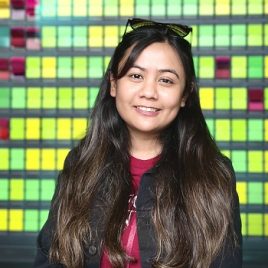See the Summer Ecopreneurial Immersion (Eco-SEI) Fellowship awardees for 2024.
Josh Cohen
Josh Cohen is an MBA candidate at Stanford’s Graduate School of Business (GSB), where he focuses on the role of software in the energy transition. Prior to the GSB, Josh led an engineering team at Raptor Maps, an early stage startup building software for the solar industry. He was based in Greentown Labs, the largest climate tech incubator in North America, and served on Greentown’s member committee. Josh cut his teeth in as an engineer at Meta, where he spent four years launching products like Instagram Fundraisers and Reels to Meta’s 2B+ users. He holds a B.S. in Computer Science from Stanford University.
Eco-SEI Focus – Surge
Surge is accelerating battery R&D with modern software. Joshʼs time supporting startups at Greentown Labs showed him firsthand how painful battery R&D can be. He saw electrochemistry startups struggle with large datasets, buggy sensors, and complex experiment protocols. Surge is building world-class developer tools for battery researchers.

Aramis Dufour & Antoine Alary
Aramis is driven by a passion for energy and a commitment to fighting climate change. Before coming to Stanford to earn a MS degree in Atmosphere/Energy from the Civil and Environmental Engineering department, Aramis studied math and energy systems at École Polytechnique. He worked on a European power trading desk and is currently a research assistant at SLAC, working on algorithms to analyze distributed PV systems. Aramis is eager to understand how the millions of energy inefficient traditional European homes could effectively be retrofitted, lowering energy bills for everyone while providing major climate benefits.
Antoine is passionate about energy problematics and driven by the urge of fighting climate change to limit its impact on the most vulnerable. Before joining the Civil and Environmental Engineering MS on Atmosphere/Energy at Stanford, he earned an engineering degree at Ecole Polytechnique studying energy economics and renewable electricity production. His experiences in the private sector and academia, focused on renewable energy systems and project development, convinced him that decarbonization of the grid was only part of the solution, and that other aspects like energy efficiency were necessary components of a just and sustainable world
Eco-SEI Focus – Effinov
Residential buildings account for 44% of France’s primary energy consumption, and contribute to 20% of related greenhouse gas emissions. Technologies for high-performing energy retrofits are mature, but the market is hindered by small-scale improvements with limited impact. Upfront cost is a major deterrent for French homeowners. Effinov would solve this pain point as a third-party financing company. It would pay the upfront cost of deep retrofits and earn back returns on the energy savings. This would involve estimating the upfront cost and savings of a retrofit, identifying and securing subsidies and 0% public loans, and financing the remaining part.
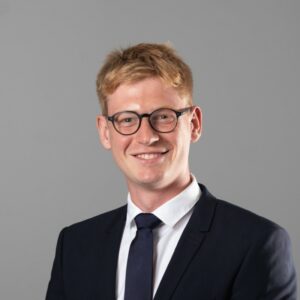
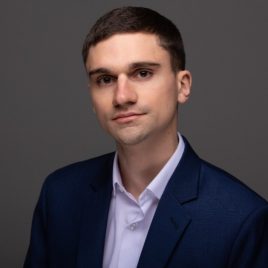
Johanna von der Leyen
Johanna is a graduate student in International Policy and Environmental Science at Stanford. Prior to coming to Stanford, she worked at McKinsey’s Sustainability Practice, advising private sector clients on sustainability strategies and climate risk topics. During her parental leave from McKinsey, she received a Master of Philosophy in Environmental Policy from the University of Cambridge (UK). At Stanford, Johanna’s work focuses on addressing environmental issues from a business and policy perspective. Her interest is centered on harnessing technological innovation to address nature- and climate-related challenges, with a focus on risk assessment, adaptation strategies, and the scalable implementation of nature-based solutions.
Eco-SEI Focus – NatureAssets
How can infrastructure and land asset owners increase the resilience of their assets against climate change and simultaneously uplift their assets’ value? By seeing nature as part of the solution and investing in nature-based solutions (NbS). Our project NatureAssets aims to develop software-based solutions to enable asset owners to navigate NbS investments and identify suitable NbS based on local conditions, future projections, and nearby partnership opportunities. This results in an automated optimal solution that leverages all available synergistic ecosystems and stakeholders and replaces the piece-meal and very manually intensive approaches of the past.
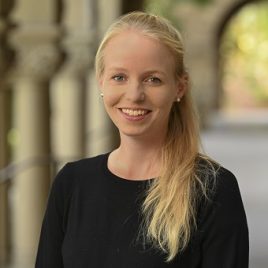
Yalcin Aydin
Yalcin Aydin is an accomplished sustainability consultant and engineer with five years of experience in the energy and manufacturing sectors, currently pursuing an MBA and MS E-IPER at Stanford University. His career highlights include designing a comprehensive decarbonization strategy that supported a nation’s transition to net-zero emissions, enabling significant growth and international expansion for a solar and wind energy company, and spearheading the development and distribution of a novel COVID-19 diagnostic test kit during the pandemic. Yalcin is deeply committed to sustainable development and is particularly interested in finding low-carbon, low-cost geologic hydrogen reservoirs.
Eco-SEI Focus – Hydrify
Hydrify is pioneering the future of hydrogen production with its innovative technology for enhancing geologic hydrogen. By leveraging advanced AI algorithms and reaction modelling expertise, Hydrify strategically identifies and stimulates hydrogen-rich source rocks near demand centers, enabling efficient, low-cost, and low-carbon hydrogen production on demand.
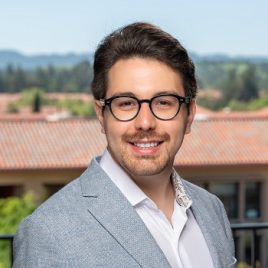
Jake Blank
Jake (MBA ’25) is an MBA candidate at the Stanford Graduate School of Business passionate about energy and climate infrastructure. Before coming to Stanford, Jake spent several years in New York investing in clean energy as a Deputy Director for D. E. Shaw Renewable Investments, driving and underwriting acquisitions of climate infrastructure projects representing over $1bn in investment. Jake has an undergraduate degree in Economics and a Master’s degree in Public policy focused on electricity markets from the University of Virginia, where he was a Jefferson Scholar.
Project Mergo – Corporate Decarbonization
Per the Rocky Mountain Institute, 23,000 companies representing >50% of global market capitalization have near-term climate commitments. Mergo is focused on finding solutions for the businesses which credibly & certainly reduce emissions from harder to abate sources of greenhouse gas, with minimal disruption to their business practices or growth plans.
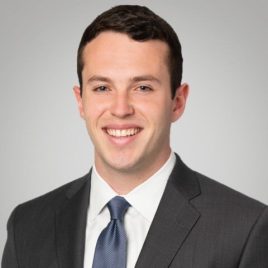
Ryan Bayne
MBA ’25. Previous Mechanical Engineer for mobile microgrids bringing fail safe power to largest events and entertainment in the US.
Eco-SEI Focus – VoltIQ
Facilitating mega-load interconnection and proactive grid investments for an increasingly capacity constrained grid.
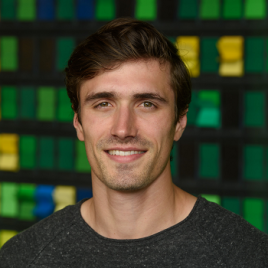
Camila Nicollier Sanchez
Camila is an Industrial Engineer with a background spanning 5 years across both big corporations and early-stage startups. She has experience coordinating and scaling Data Science and Data Engineering teams to develop and optimize ML models that serve the strategic decision-making process. Her background blends a robust business mindset with a deep technical understanding that is being refined while pursuing her master’s degree in Statistics and Data Science at Stanford. This combination equips her with the skills to coordinate technical teams, ensuring their actions align with the business needs and vision.
Emily Capstick
Emily is a Masters in International Policy student specialising in AI & Climate. Emily joined Stanford from Oxfam, where she served as Strategic Adviser to the CEO. Before Oxfam, Emily worked at McKinsey helping start-ups, tech companies and government leaders to solve problems, particularly those related to digitisation and sustainability. Emily graduated from the University of Oxford with a first-class degree in History and Politics and the Kirkaldy Prize for her research into the history of AI. As a first-gen college student, Emily is passionate about increasing equality of opportunity and in her free time likes to play rugby and quote the West Wing (mostly inaccurately).
Eco-SEI Focus – PermitPal
PermitPal is a matchmaking platform working to bring together renewable energy developers who are primed to power the green revolution across America, and rural communities who stand to gain local jobs, local tax revenue, and lower energy costs from working with these developers. Our matchmaking works by sharing with developers each county’s nuanced community dynamics and detailed history of infrastructure development. We help developers use these insights to plan where to build, and craft community engagement strategies to mitigate opposition.
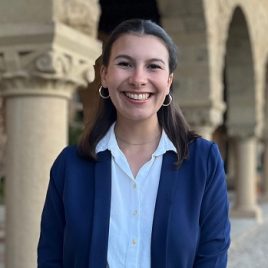
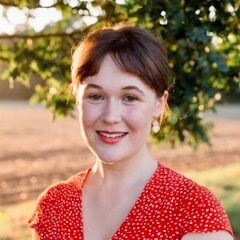
Oskar Triebe
Oskar is passionate about renewable energy and machine learning. As a PhD student in Industrial Artificial Intelligence, he pioneers forecasting solutions for the power grid. He developed NeuralProphet, an open-source project merging deep learning and statistical methods for time series. He has experience working at AI startups of various sizes and extensive applied research experience including collaborations with energy companies and RTOs. He is on a mission to decarbonize the power grid, ensuring reliable and cost-effective power for all.
Eco-SEI Focus – Aika
The renewable power transformation is putting stress our power grid infrastructure. Distributed power resources, electric vehicles, and volatile renewable power resources are challenging the accurate matching of demand and supply of power and pushing local power lines and transformers to their limits. In order to better utilize our existing resources and continue decarbonizing the grid, we need better forecasting of demand and renewable generation for reliable and low-cost power supply.
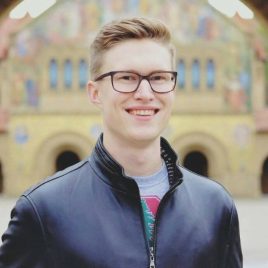
Richa Chaturvedi
Richa Chaturvedi is a joint Harvard MPA & Stanford MBA ’25 student passionate about using creative capital to fund the climate transition. She has worked across the climate finance ecosystem, including roles at BlackRock Sustainable Investing, New Leaf Climate Partners, the state of Hawaii, and the Department of Energy’s Loan Programs Office. In her free time Richa can be found swimming or searching for spicy food.
Eco-SEI Focus – Forus Capital
Today, millennials are being sidelined from financially participating in the energy transition. In the US, qualified investor rules keep most retail investors out of private markets where much of the climate investment opportunity lies. Instead, these investors can access a limited number of sustainably-branded ETFs and mutual funds across their personal investment and 401(k) accounts. At the same time, climate founders are eager for funding but are having trouble finding the right source of capital. Materials, industrials, energy efficiency, and other heavy tech companies often do not meet the return or time horizon profile of venture investments and struggle to find other funding. Forus is a new market that matches the supply of capital (retail investors) with the corresponding demand for climate financing (climate founders).

Stephen Han
Vrinda Sharma
Vrinda is passionate about addressing challenges at the intersection of climate, biology, and business. She is currently pursuing an MS in Environmental Engineering, focusing on engineering bacterial metabolic pathways to utilize carbon dioxide as feedstock for producing advanced bioplastics. Prior to her studies at Stanford, Vrinda worked as a Research Associate at Pivot Bio, an AgTech startup funded by Breakthrough Energy, where she engineered microorganisms to fix atmospheric nitrogen. She is eager to combine her technical skills with entrepreneurship and gain more experience in scaling up and commercializing scientific innovations.
Eco-SEI Focus – GreenSynth
GreenSynth offers a platform for highly efficient biomanufacturing. Our mission is to combine AI, ML, and synthetic biology to optimize cellular redox chemistry for significant improvements in synthesis of products in organisms. These chemical and biological products cater to a wide range of industries, including pharmaceuticals, specialized academic labs, and both niche and large manufacturers. Our technology unlocks versatility and efficiency in biology to reduce monetary and environmental costs. Additionally, it serves as a breakthrough innovation to increase yields in climate solutions, agricultural crop production, biomedical R&D, bioprocessing, and manufacturing.
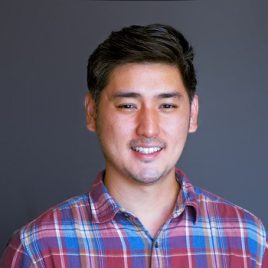

Summer Shaw
Summer is excited to build businesses that tackle roadblocks in the transition to a low-carbon economy. Before coming to Stanford to earn her JD/MBA, Summer worked in consulting at McKinsey & Company, early-stage climate tech incubation at Google X, and state government operations and policy in Missouri and New York. At Stanford, Summer has focused on barriers to financing and developing low-carbon infrastructure through her work at the Department of Energy Loan Programs Office and CIM Group. In her free time, she loves to sail (preferably on warm, sunny days), experiment with new recipes, and attempt the crossword.
Eco-SEI Focus – Scaling up renewable energy infrastructure
What does it take to scale-up renewable energy infrastructure and develop a robust domestic supply chain for low-carbon materials? Summer’s project focuses on the challenges in manufacturing, procuring, constructing, and permitting renewable energy infrastructure in the U.S. She is particularly interested in how traditional industries can adapt and thrive amidst the energy transition.
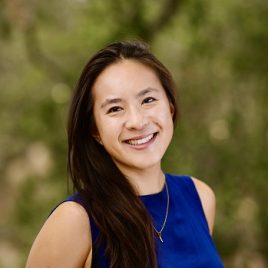
Tripp Twyman
Tripp is a second-year MBA (’24) from San Diego, CA. He completed his Bachelors Accounting, Finance and Entrepreneurship at the University of Arizona. He wrote his honors thesis on the differences between the entrepreneurial environments of the United States and Japan. His capstone entrepreneurship project was a venture to commercialize a molecule invented in a chemical engineering lab at UA. Before the GSB, he worked in strategy consulting at Boston Consulting Group focusing on large-scale change projects. Tripp also loves fresh baked cookies, scuba diving and trying new recipes.
Eco-SEI Focus – Urban Wind Flow Modeling
We’re exploring whether real estate developers would buy a software tool that uses machine learning and computational fluid dynamics to predict wind flow patterns in cities. Climate change will impact building design, construction and comfort. This tool could offer the data to guide real estate adaptations in urban areas.
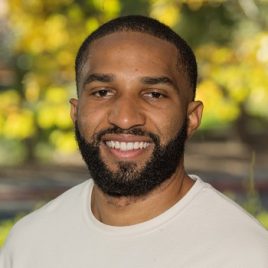
Nan Li
Nan is currently pursuing an MSx degree at Stanford GSB. Before joining Stanford, Nan co-founded and served as a board director of Silk Sportscar Company, an automotive manufacturing firm with operations in Italy, China, and the US. Silk specializes in new energy supercars. Prior to Silk, Nan co-founded Trella, a forestry technology company focused on carbon emission insetting through closed-loop forestation services. Additionally, Nan serves as a Board Director at the US-China Green Institute, where he contributes to global cooperation for sustainable environmental solutions. Being an entrepreneur, Nan is committed to sustainable development through technology breakthroughs.
Eco-SEI Focus – IgniX
Addressing the climate crisis and upcoming bans on gas and diesel vehicles necessitates sustainable alternatives. While EVs are beneficial, they face limitations in medium and heavy-duty applications due to lower power density relative to weight and limited range. Hydrogen enables longer travel on less fuel, and the DOE’s plan to reduce green hydrogen costs enhances its viability. With an established supply chain, hydrogen engine-based solutions could be ideal for medium and heavy-duty vehicles. This project aims to analyze the market potential and commercialization strategies of hydrogen engine-based vehicles, focusing on early adopter applications such as fleet operations, where infrastructure limitations can be mitigated.
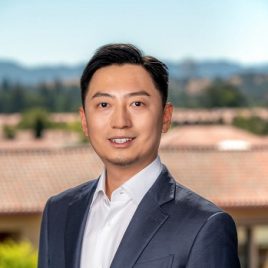
Justin West
Justin West ‘25 is a B.S. candidate in Computer Science with a specialization in Artificial Intelligence. He has conducted research in transitioning institutions towards Zero Waste. Justin is committed to the ethical application of data. While working at the City of San Jose, Justin founded the GovAI Coalition, which attracted over 100 government agencies and set a national standard for AI procurement. As a Sustainability Data Analyst at Stanford, he implemented a campus-wide Internet of Things (IoT) sensor network and developed machine learning models that significantly reduced resource consumption, saving approximately $600,000 annually.
Eco-SEI Focus – Scheduling for Sustainability
The Scheduling for Sustainability (S4S) initiative is designed to maximize efficiency in HVAC scheduling across commercial buildings. Utilizing occupancy-based strategies, this platform leverages database technologies and integrates existing automation and data management frameworks. By employing a standardized building data ontology with sophisticated meta-tagging, S4S simplifies the operational process and enhances transparency without necessitating extensive technical expertise from users. The initiative features a user-friendly graphical user interface (GUI) built around effective change management techniques. The occupancy-based program for HVAC scheduling has the potential to achieve global energy savings of 1-2%, equating to billions in annual cost savings.
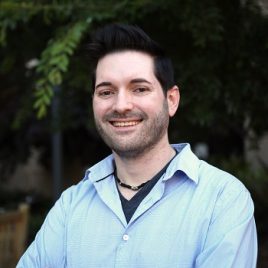
Serena Rivera-Korver
Serena is a dual degree candidate pursuing an M.A. in International Policy and an M.S. in Environment and Resources. Her environmental journey began after witnessing the devastation of Hurricane Irma and Maria in St. Martin. This inspired her to focus on sustainability, assisting Duke University with a purchase of 17,000 tons of carbon credit options and investing in sustainability-focused startups at Ulu Ventures. At Stanford, Serena aims to bridge the gap between science, technology, finance, and emerging markets. With a background in product management and venture capital, she is committed to accelerating scalable solutions to climate change.
Eco-SEI Focus – Scaling Uncertainty Aware MRV
Measurement, Reporting, and Verification (MRV) is a process used to track and confirm the amount of greenhouse gases removed by CDR projects. It ensures transparency and accuracy in climate efforts by providing methods to measure progress and verify results. Yet scientific uncertainties abound, and a lack of standardization and trust has hampered the growth of carbon markets. Serena is exploring the best pathways to scale for best-in-class MRV solution for nature-based and open systems projects developed by the Maher Lab with the Stanford Sustainability Accelerator.
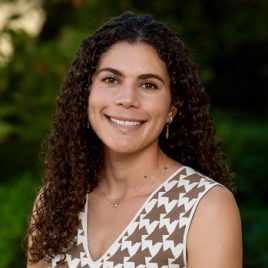
Suman Kumar
Suman is pursuing an MIP-EIPERs degree as a Knight Hennessy Scholar. After the Nepal earthquake, he collaborated with non-profits to design and manufacture machines that built 5,365 shelters for over 26,000 victims. His social venture rebuilt two schools for 150+ students and created a digital learning platform for 500+ students with limited educational access. During the COVID-19 pandemic, Suman led technological innovation projects in Nepal, collaborating with UCSF, Berkeley, and Stanford labs which. His manufacturing business built machines for waste-recycling factories, Nepal’s first aquaponics farm, and a UN research project.
Eco-SEI Focus – Soft Magnets
This project focuses on developing low core loss magnets for use in high efficiency electric machines by using materials that minimize eddy currents.

Pingyu Wang
(PhD ’24) Pingyu leverages advanced microfabrication technologies to innovate scalable and affordable biosensors. They seek to interface biological systems with advanced bioelectronics, and gather unprecedentedly rich data that reveal the complex dynamics that are inaccessible with current technologies. This will inform more effective management of biological systems and tackle challenges ranging from human health to the environment.
Gradie Ngaruka
Gradie is passionate about solving pressing issues in the Global South, with a focus on Congo and the African continent. She is currently pursuing an MS in Chemical Engineering after completing her Bachelor’s in the same field at Stanford. During her undergraduate studies, Gradie worked in the Bao Group, contributing to the development of self-healing sensors. She also served as a consultant for a bioenergy startup in Rwanda, aiming to provide affordable electricity through biodigesters. Her most fulfilling work was starting a non-profit with friends in Rwanda that empowers single mothers and vulnerable high school students. Given the disastrous impact of climate change on her community back home, Gradie is particularly interested in addressing food insecurity and improving fertilizer adoption and efficiency back home.
Eco-SEI Focus – CycleN
A potent and often overlooked greenhouse gas, Nitrous oxide (N2O), has a global warming potential 300 times greater than CO2. Predominantly emitted by the agricultural and waste treatment sectors, N2O is a significant environmental threat. Our project aims to evaluate the market for an innovative low cost nitrous oxide sensing and removal technology tailored for these sectors. We will focus on understanding customer needs and navigating regulatory challenges, emphasizing the benefits of of quantifying and converting waste emissions into valuable agricultural resources. This will be done through surveys, interviews, and focus groups to gather insights that informs our technology’s adaptation.
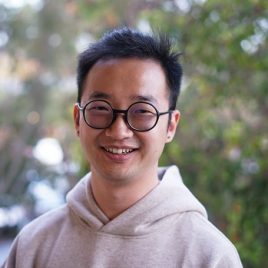

Sabrina Afroz
Before coming to Stanford, Sabrina (MBA’25) served as a Senior Economist at the Financial Accountability Office of the Legislative Assembly of Ontario, Canada. She led the first-of-its-kind project in Canada to quantify the cost of climate hazards on a $700 billion public infrastructure portfolio of roads, bridges, stormwater, wastewater, and buildings, identifying budgetary needs to maintain the public infrastructure in a state of good repair over the rest of the century. Through this experience, Sabrina recognized the critical need for proactive measures to address climate risks and prevent the failure of vital infrastructure assets.
Eco-SEI Focus – ResilienceIQ
This summer, Sabrina is exploring how water infrastructure managers can identify failure risks of their critical assets early and minimize maintenance and capital spending. In the US, aging drinking, stormwater, and wastewater assets face higher failure risks, exacerbated by extreme weather events. According to an ASCE report, an estimated $7.6 billion of treated water was lost in 2019 due to leaks. Sabrina is exploring the idea of a streamlined platform that leverages machine learning to predict failure risks, enable scenario planning, and minimize the maintenance and capital costs over the lifecycle of critical assets.
